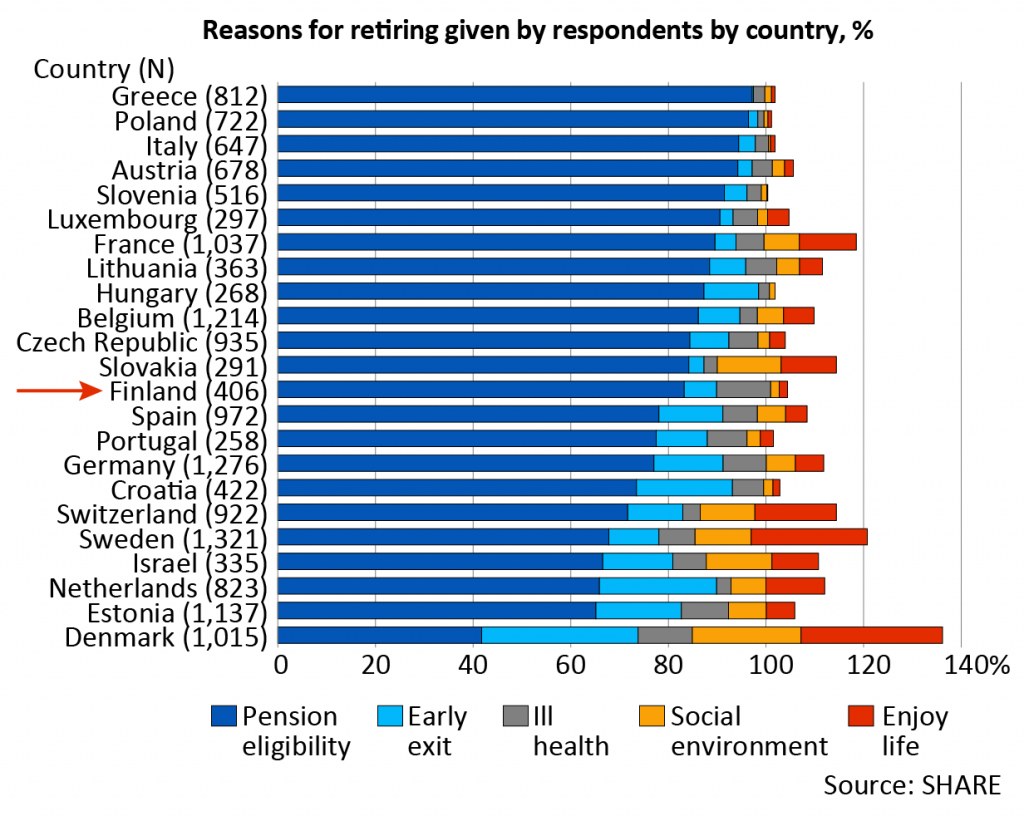Why retire? Because we can
While there is rich research on Finnish retirement, relatively little is known about personal motivations behind retirement decisions. In latest round of the Survey on Health, Ageing and Retirement in Europe (SHARE) Finnish pensioners were asked a simple question: Why did you retire? More than 80 per cent indicated that they retired because they became eligible for a pension. Compared to other European pensioners, the influence of poor health on retirement decisions in Finland raises concern.
The SHARE data has been collected in a growing number of countries since 2004 and the eighth wave of data was released this summer. It covers people aged 50 years or older in 29 countries, many of whom have been interviewed in several waves.
Finland joined SHARE in wave 7. In the latest wave 8, retired Finnish respondents were asked for the first time the question: for what reasons did you retire? Respondents could list more than one reason, choosing from a list of ten options. These can be regrouped into five categories:
- Becoming eligible for a pension (including public, occupational and private pensions),
- Early exit (being offered an early retirement option or being made redundant),
- Own ill health,
- Social environment (including: ill health of a friend or relative, to retire at the same time as spouse, or to spend more time with family), and
- To enjoy life.
The results below apply to those who retired after 2004 and were at least 60 years old at the time of retiring.
Figure: Reasons for retiring given by respondents by country, %. Note that more than one reason can be provided and percentages therefore exceed 100. Countries’ sample sizes in brackets.

Following the lead of the pension system
Among Finnish retirees, 83 per cent indicated that they retired because they became eligible for a pension. Almost 7 per cent retired due to early retirement, while 11 per cent retired because of ill health. These results showed no strong differences between Finnish men and women.
Less than 2 per cent said they retired because of factors in their social environment, all of whom were women. Moreover, less than 2 per cent retired to enjoy life.
Finns seem to primarily retire because and when they can. This is good news for Finnish pension policymakers. As the retirement age is rising, people are likely to follow and retire when they become eligible for a pension (Nivalainen, 2021). However, it is worrying that Finland has the second-highest percentage of pensioners (and the highest among men) in Europe mentioning ill health as a push factor for retirement.
Overall, Finland finds itself somewhere in the middle compared to the rest of Europe. On the one extreme there are countries like Greece, Poland, Italy, Austria, and Slovenia where pension eligibility was the main reason retirement for almost over 90 per cent of the pensioners, while other factors played almost no role in retirement decisions. On the other extreme are, for example, Denmark, Estonia, the Netherlands, Israel, and Sweden, where pension eligibility plays a much smaller role. In these countries, retirees were also more likely to give more than one reason for retiring, with the social environment and enjoying life often influential in retirement decisions. It is possible that in the latter countries the pension system provides more flexibility to take these preferences into account.
A blind spot in Finnish retirement research?
Family, friends and enjoying life are of course important for Finns. They perhaps just do not play a direct role in retirement decisions when pension eligibility is a precondition for financially making ends meet when work stops. Pension eligibility rules can also shape people’s retirement decisions by reinforcing societal norms about retirement timing (Gruber et al., 2019).
Still, more research is needed on Finnish pensioners’ motivations for retirement. What are their hopes and expectations for life as a pensioner and to what extent do these become reality? What is the role of spouses, children, grandchildren, and social networks? In 2022, the Finnish Centre for Pensions is planning to launch a new survey among those who retired after the 2017 pension reform to investigate such factors in more detail.
References
Gruber, J., Kanninen, O., Nivalainen, S., Ravaska, T. & Uusitalo, R. (2019). The effect of relabeling and incentives on retirement: Evidence from the Finnish pension reform in 2005. Labour Institute for Economic Research Working Papers, 328
Nivalainen, S. (2021). Eläkeaikeiden muutos vuosina 2008–2018 ja eläkeaikeet vuonna 2018. Eläketurvakeskuksen tutkimuksia, 02/2021.
Note
SHARE Waves 2, 4, 5, 6, 7 and 8 were used (DOIs: 10.6103/SHARE.w2.710, 10.6103/SHARE.w4.710, 10.6103/SHARE.w5.710, 10.6103/SHARE.w6.710, 10.6103/SHARE.w7.711, 10.6103/SHARE.w8.100).
